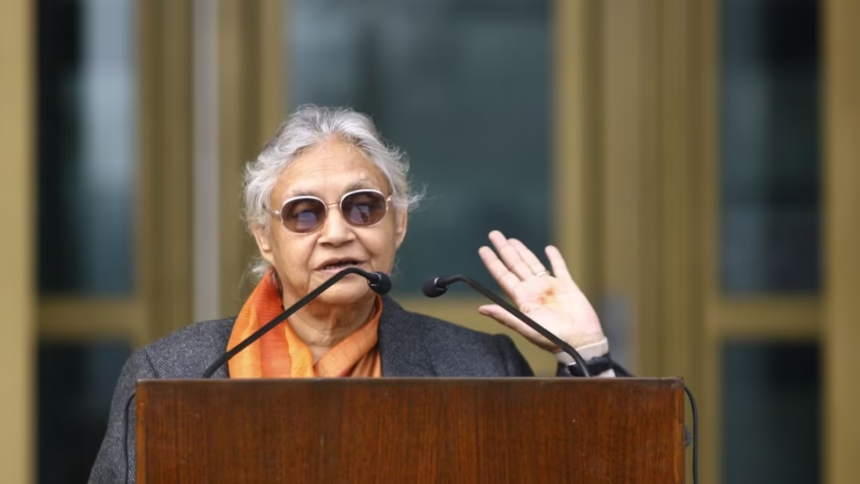Sheila Dikshit: The Legacy of a Visionary Leader
Sheila Dikshit, the former Chief Minister of Delhi, is a name synonymous with urban transformation and progressive leadership. Serving as Delhi’s longest-serving Chief Minister from 1998 to 2013, her tenure left a lasting impact on the capital city, particularly in the areas of infrastructure, education, and healthcare. Known for her calm demeanor, strong leadership, and visionary approach to governance, Dikshit’s contributions continue to shape Delhi’s development. This biography delves into her life, achievements, challenges, and the deep influence she had on the city.
Early Life and Education
Sheila Dikshit was born on March 31, 1938, in the city of Kapurthala, Punjab, into a family with a rich educational and political background. She was the daughter of a prominent civil servant, and her family encouraged her academic pursuits. Dikshit attended the Convent of Jesus and Mary in New Delhi, and later graduated in History from the University of Delhi. Her early education fostered a deep understanding of India’s cultural and social history, which influenced her leadership style later in life.
In 1962, Sheila Dikshit married the late Deepak Dikshit, an officer in the Indian Administrative Service, and they had a son, Sandeep. Her personal life remained private, with Sheila Dikshit focusing mainly on public service and social welfare throughout her political career.
Entry into Politics
Sheila Dikshit’s political journey began in the early 1980s when she was appointed as the Indian National Congress (INC) party’s candidate for the 1984 parliamentary elections. Although she did not win that election, it marked the beginning of her political involvement. Sheila was deeply influenced by her mentor, the then Prime Minister Indira Gandhi, and her commitment to social causes and public service.
In 1984, she was elected as the Member of Parliament from the North East Delhi constituency, which proved to be a stepping stone in her political career. Over the years, she gained prominence in the Congress party for her ability to engage with local issues and her capacity for effective governance.
Chief Minister of Delhi: A New Era of Development
Sheila Dikshit’s tenure as Chief Minister of Delhi, spanning from 1998 to 2013, is remembered as a period of remarkable transformation. She is credited with turning Delhi into one of India’s most developed and modern cities. Here are some of her key achievements:
- Urban Infrastructure Development: Sheila Dikshit’s government focused extensively on urban planning and infrastructure. She oversaw the development of major roads, flyovers, and the construction of the Delhi Metro. Under her leadership, Delhi saw an upgrade in its infrastructure, making the city more accessible and modernized. The Delhi Metro, a crowning achievement, transformed public transportation in the capital, alleviating traffic congestion and reducing pollution.
- Education and Healthcare: Dikshit was committed to improving the educational and healthcare systems in Delhi. She launched various initiatives to enhance the quality of education in government schools and worked towards making healthcare more accessible to the city’s underprivileged. New hospitals were built, and existing ones were modernized. Her government also focused on improving basic amenities such as sanitation, water supply, and public health services.
- Women’s Empowerment and Social Welfare: Sheila Dikshit placed a strong emphasis on women’s empowerment and social welfare. She supported programs aimed at reducing gender inequality, providing vocational training for women, and improving the safety of women in Delhi. Her policies included increased support for women entrepreneurs and initiatives to reduce domestic violence and other forms of abuse.
- Delhi’s Economic Growth: Sheila Dikshit also worked to improve Delhi’s economy by attracting investments and promoting entrepreneurship. She supported the growth of the service and technology sectors, which played a vital role in making Delhi a hub for business, technology, and education. During her tenure, Delhi became one of India’s most economically developed regions.
Personal Traits and Leadership Style
Sheila Dikshit’s leadership style was marked by her calm and composed demeanor, her ability to listen, and her deep understanding of the needs of the people. She was known for her inclusive approach to governance, where she made efforts to bring together people from diverse backgrounds, communities, and political views. This helped her build a broad base of support and navigate Delhi’s complex socio-political landscape.
One of Dikshit’s most admired qualities was her ability to work with opposition parties and forge alliances when necessary. She believed in finding solutions through dialogue and consensus-building, which enabled her to push forward major developmental projects despite political challenges.
Legacy and Impact
Sheila Dikshit’s legacy as a leader is one of progress and transformation. Her tenure as Chief Minister of Delhi saw the city undergo significant changes, from improved infrastructure to better public services. She also made crucial strides in building Delhi’s global reputation as a vibrant and modern city.
Her efforts to modernize Delhi’s transportation system with the Delhi Metro, her focus on sustainable development, and her work towards better healthcare and education ensured that the citizens of Delhi benefited from her leadership. She was instrumental in creating a vision for the city that looked beyond short-term fixes and focused on long-term sustainable development.
Challenges and Criticism
Despite her many successes, Sheila Dikshit’s tenure was not without challenges. She faced criticism over issues related to corruption within her government and the rise in pollution levels, particularly due to the increasing number of vehicles in the city. Additionally, some questioned the effectiveness of her government’s efforts to address the city’s burgeoning population and its social issues.
However, her ability to work through these challenges and maintain her popularity among the people of Delhi reflects her resilience and her commitment to making the capital city a better place for everyone.
Personal Life and Family
Sheila Dikshit was known for her disciplined and private personal life. She was deeply dedicated to her family, especially her son, Sandeep, who was involved in social causes and public life. Sheila Dikshit’s leadership was guided by a sense of duty to the people of Delhi, and she always prioritized public welfare over personal gain.
Her untimely passing on July 20, 2019, left a void in the political landscape of Delhi, and she was mourned by citizens across the city. Her contributions to public service, education, and women’s empowerment continue to inspire future generations of leaders.
Conclusion
Sheila Dikshit was more than just a politician; she was a visionary leader who changed the face of Delhi. Her contributions to urban development, healthcare, education, and women’s empowerment leave a lasting legacy. Her tenure as Chief Minister is a reminder of the power of steady leadership and a deep commitment to the welfare of the people. Through her work, she demonstrated the true meaning of public service, making her one of the most respected leaders in India’s modern political history.
FAQs
1. What were Sheila Dikshit’s main contributions to Delhi’s development?
Sheila Dikshit is credited with transforming Delhi’s infrastructure, including the development of the Delhi Metro, improved roads and flyovers, and better healthcare and education services.
2. What was Sheila Dikshit’s leadership style?
Sheila Dikshit’s leadership style was characterized by calmness, inclusivity, and a focus on dialogue and consensus-building. She was known for her ability to work with various political parties and communities.
3. What was her legacy as Chief Minister of Delhi?
Her legacy includes the modernization of Delhi’s transportation system, improvements in education and healthcare, and her focus on women’s empowerment and sustainable development.










